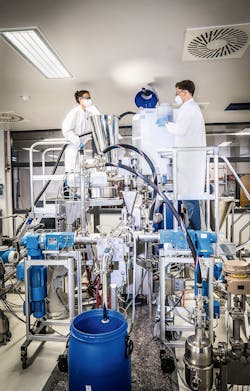Bühler delivers battery slurry extruder to Fraunhofer test lab in Germany
Bühler Group reported Aug. 31 that Fraunhofer Research Institution for Battery Cell Production will use its 30-millimeter extruder at FFB’s new R&D site in Münster, Germany, where the Fraunhofer-Gesellschaft research organization is also building its FFB PreFab test facility spanning more than 6,000 square meters.
In parallel, the Fraunhofer-Gesellschaft is also building an industrial plant, called FFB Fab, where Bühler’s 93-millimeter extruder will enable a throughput of up to about 1,200 liters of electrode/battery slurry per hour. FFB has been operating Bühler’s technology for continuous mixing of battery slurry since 2021.
Fraunhofer-Gesellschaft plans to play a leading role in developing industrial battery production facilities in Europe. The construction of its test facility in Münster and a gigafactory on the same site are part of this plan. “Fraunhofer FFB has a clear goal. We research and develop solutions for scaling production technology for lithium-ion batteries,” says Markus Eckstein, research associate at Fraunhofer FFB. “Our customers are German automakers, who want to get into battery production to make themselves less dependent on international suppliers and plant manufacturers in the battery industry.”
The outer shell of FFB PreFab is already in place 10 kilometers south of the existing FFB Workspace pilot plant at Hansa-Business Park Münster. Construction should be done in 2024, and the existing Bühler 30-millimeter extruder installation will be moved to the FFB PreFab. The pilot combines an industry-relevant production with simple operation. “Thanks to its modular design, many process parameters can be run down quickly, so mixing processes can be efficiently optimized,” explains Philipp Stoessel, team manager for process technology grinding and dispersing at Bühler.
In their 6,000-square-meter space, FFB PreFab’s teams will conduct experimental research with customers and universities. “In our innovation modules, we can take advantage of the shorter changeover and cleaning times,” adds Eckstein. “This allows us to improve existing processes, apply new technologies, and extrapolate the knowledge gained to industrial applications.”
Bühler reports its continuous-mixing process is unique because it allows raw-material dosing, premixing, kneading, fine dispersing and degassing in one device. “Thanks to Bühler’s continuous mixing technology, we can determine accurate parameters for scaling and transfer them to the gigafactory scale,” explains Eckstein. “Bühler’s battery experts keep challenging us to look at things in new ways, and we’re in active exchange when it comes to new technologies and best practices. For example, we’re fascinated by QuaLiB, an in-house development at Bühler, which allows the quality of the electrode slurry to be analyzed in real time and ensures traceability of the process.”
Stossel adds, "It’s exceptional to see a research organization building up an entire lithium-ion battery plant to perform research at the ton scale. Such industry-relevant research will generate precious know-how, and might enable the closing of the technology gap between Europe and Asia. Furthermore, it’s an ideal platform to build a skilled workforce for the battery industry. For Bühler this is a lighthouse project that will further promote fully continuous mixing technology.”
About the Author

Leaders relevant to this article:

